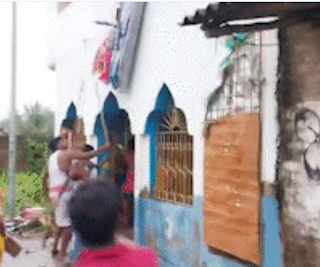The tragic case of an 11-year-old girl, whose body was found in a canal in West Bengal's South 24 Parganas district, has triggered an uproar across the region, leading to massive protests and clashes with the police. The girl had been missing since Friday night after she failed to return home from her tuition classes, sparking immediate concern from her family. According to their statements, they approached the local police station to file a missing person report, but instead of receiving the necessary help, they were allegedly harassed by the police, adding further distress to an already agonizing situation.
The discovery of the girl’s body has fueled intense anger among the local community, who believe that the police's failure to take their complaints seriously may have contributed to the girl’s death. Her family and villagers have alleged that she was raped before her body was dumped into the canal, an accusation that has heightened the emotional stakes in the case. The sense of injustice felt by the family and their neighbors has been palpable, leading to widespread unrest in the district.
Videos circulating online show the sheer scale of the protests, with hundreds of local residents, particularly women, taking to the streets armed with sticks and makeshift weapons, demanding justice. In some footage, villagers are seen surrounding the police station, shouting slogans, and confronting the officers for their failure to act swiftly. Another video captures the moment when the protests turned violent, with angry villagers vandalizing the police station, smashing windows, damaging police vehicles, and pelting stones at the authorities in a raw display of frustration and fury. Public property was also damaged in the chaos, with motorcycles and other government-owned assets being destroyed as the crowd vented their outrage.
The incident has also attracted sharp political reactions. BJP leader Amit Malviya took to social media to heavily criticize the Mamata Banerjee-led West Bengal government, holding it responsible for the deteriorating safety of women and girls in the state. In his post on platform X, Malviya accused the state’s ruling party of failing to protect its female citizens, particularly during a time as culturally significant as Durga Puja, when the feminine power of Devi Shakti is celebrated. He suggested that under the current leadership, “Asuri Shaktis” (demonic forces) continue to thrive, resulting in unchecked violence and crime against women. Malviya’s statement, "Mamata Banerjee has to GO for women to be safe in Bengal," has added a political dimension to the already volatile situation, reflecting deeper dissatisfaction with the state's governance.
As tensions continue to rise, the situation remains volatile in South 24 Parganas, with local authorities struggling to contain the unrest. The incident has reignited long-standing concerns about the safety of women and girls in the region, raising questions about the effectiveness of local law enforcement and the systemic issues that lead to such tragic outcomes. The public's growing frustration with the police’s perceived negligence and the slow pace of justice has only intensified calls for a thorough investigation and accountability from those in power.
Community leaders and activists have joined the growing chorus, demanding reforms in how police handle sensitive cases involving women and children. The outcry underscores the deep-rooted challenges of ensuring justice for vulnerable groups in areas where institutional failures are common. As protests spread to other parts of the district, the victim’s family continues to push for justice, urging state and central authorities to step in and take immediate, decisive action against those responsible, both for the crime and for the alleged mishandling of the case by the local police.
The broader context of this tragedy reflects a societal crisis, where women and children continue to face significant threats despite widespread calls for change. This case has shone a harsh light on the systemic failures within the state’s law enforcement and judicial systems, leaving many in the community feeling vulnerable and unsupported. The public's demand for justice goes beyond this one incident, signaling a deeper need for reforms that will ensure the safety and protection of women and girls in West Bengal and across India. As investigations continue, all eyes are on the state government and police authorities, with the community demanding that this case be treated with the seriousness and urgency it deserves.



